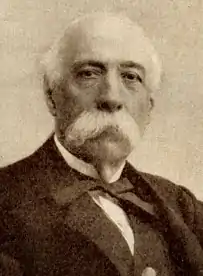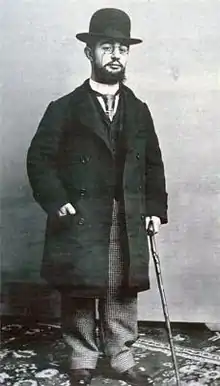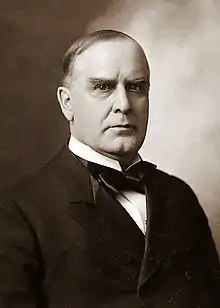1901
1901 (MCMI) was a common year starting on Tuesday of the Gregorian calendar and a common year starting on Monday of the Julian calendar, the 1901st year of the Common Era (CE) and Anno Domini (AD) designations, the 901st year of the 2nd millennium, the 1st year of the 20th century, and the 2nd year of the 1900s decade. As of the start of 1901, the Gregorian calendar was 13 days ahead of the Julian calendar, which remained in localized use until 1923.
| Millennium: | 2nd millennium |
|---|---|
| Centuries: | |
| Decades: | |
| Years: |
| 1901 by topic |
|---|
| Subject |
|
| By country |
| Lists of leaders |
|
| Birth and death categories |
|
| Establishments and disestablishments categories |
|
| Works category |
|
| Gregorian calendar | 1901 MCMI |
| Ab urbe condita | 2654 |
| Armenian calendar | 1350 ԹՎ ՌՅԾ |
| Assyrian calendar | 6651 |
| Bahá'í calendar | 57–58 |
| Balinese saka calendar | 1822–1823 |
| Bengali calendar | 1308 |
| Berber calendar | 2851 |
| British Regnal year | 64 Vict. 1 – 1 Edw. 7 |
| Buddhist calendar | 2445 |
| Burmese calendar | 1263 |
| Byzantine calendar | 7409–7410 |
| Chinese calendar | 庚子年 (Metal Rat) 4597 or 4537 — to — 辛丑年 (Metal Ox) 4598 or 4538 |
| Coptic calendar | 1617–1618 |
| Discordian calendar | 3067 |
| Ethiopian calendar | 1893–1894 |
| Hebrew calendar | 5661–5662 |
| Hindu calendars | |
| - Vikram Samvat | 1957–1958 |
| - Shaka Samvat | 1822–1823 |
| - Kali Yuga | 5001–5002 |
| Holocene calendar | 11901 |
| Igbo calendar | 901–902 |
| Iranian calendar | 1279–1280 |
| Islamic calendar | 1318–1319 |
| Japanese calendar | Meiji 34 (明治34年) |
| Javanese calendar | 1830–1831 |
| Julian calendar | Gregorian minus 13 days |
| Korean calendar | 4234 |
| Minguo calendar | 11 before ROC 民前11年 |
| Nanakshahi calendar | 433 |
| Thai solar calendar | 2443–2444 |
| Tibetan calendar | 阳金鼠年 (male Iron-Rat) 2027 or 1646 or 874 — to — 阴金牛年 (female Iron-Ox) 2028 or 1647 or 875 |
| Wikimedia Commons has media related to 1901. |
Events
January

- January 1
- The British colonies of New South Wales, Queensland, South Australia, Tasmania, Victoria and Western Australia federate as the Commonwealth of Australia; Edmund Barton becomes the first Prime Minister of Australia.
- January 5 – Typhoid fever breaks out in a Seattle jail, the first of two typhoid outbreaks in the United States during the year.
- January 9 – Lord Kitchener reports that Christiaan de Wet has shot one of the "peace" envoys, and flogged two more, who had gone to his commando to ask the Burgher citizens of South Africa to halt fighting.[1]
- January 10 – In the first great Texas gusher, oil is discovered at Spindletop in Beaumont, Texas.
- January 22 – Queen Victoria, Great Britain's longest serving monarch dies and "Bertie", the longest-serving Prince of Wales, succeeds his mother to become King Edward VII of the United Kingdom at the age of 59.[2]
- January 28 – Baseball's American League declares itself a Major League.

February
- February 2 – The funeral of Queen Victoria is held at St George's Chapel, Windsor Castle.
- February 5
- The Hay–Pauncefote Treaty is signed by the United Kingdom and United States, ceding control of the Panama Canal to the United States.
- J. P. Morgan buys mines and steel mills in the United States, marking the first billion-dollar business deal.
- In Evansville, Indiana, a fire burns through the business district, causing $175,000 of damage.
- February 11 – Anti-Jesuit riots sweep across Spain.
- February 12 – Viceroy of India Lord Curzon creates the new North-West Frontier Province in the north of the Punjab region, bordering Afghanistan.
- February 14 – Edward VII opens his first parliament of the United Kingdom.
- February 20 – The Hawaii Territory Legislature convenes for the first time.
- February 22 – The Pacific Mail Steamship Company's SS City of Rio de Janeiro sinks entering San Francisco Bay, killing 128.
- February 23 – The United Kingdom and Germany agree on the frontier between German East Africa, and the British colony of Nyasaland.
- February 25 – U.S. Steel is incorporated by industrialist J. P. Morgan, as the first billion-dollar corporation.
- February 26
- Chi-hsui and Hsu-cheng-yu, Boxer Rebellion leaders, are executed in Peking.
- The Middelburg peace conference fails in South Africa, as Boers continue to demand autonomy.
- February 27 – The Sultan of Turkey orders 50,000 troops to the Bulgarian frontier, because of unrest in Macedonia.
March
- March 1
- The United Kingdom, Germany and Japan protest the Sino-Russian agreement on Manchuria.
- The 1901 Census of India is taken, the fourth, and first reliable, census of the British Raj.
- March 2 – The United States Congress passes the Platt Amendment, limiting the autonomy of Cuba as a condition for the withdrawal of American troops.
- March 4 – William McKinley is sworn in, for a second term as President of the United States.
- March 5 – Irish nationalist demonstrators are ejected by police from the House of Commons of the United Kingdom, in London.
- March 6 – In Bremen, an assassination attempt is made on Wilhelm II, German Emperor.
- March 6 – In Maine, the 1901 Maine Flag is adopted as the official state flag.
- March 11 – The United Kingdom rejects the amended Hay–Pauncefote Treaty.
- March 17
- A showing of 71 Vincent van Gogh paintings in Paris, 10 years after his death, creates a sensation.
- Students riot in Saint Petersburg and Moscow, Russia.
- March 31
- A 7.2 Mw Black Sea earthquake occurs off the northeast coast of Bulgaria, with a maximum intensity of X (Extreme). A destructive tsunami affects the province of Dobrich.
- The United Kingdom Census 1901 is taken. The number of people employed in manufacturing is at its highest-ever level.
.jpg.webp)
April
- April 7 – Foundation of Brazilian football club Clube Náutico Capibaribe.
- April 25 – New York becomes the first U.S. state to require automobile license plates.
- April 29 – Anti-Jewish rioting breaks out in Budapest.
May
- May 3 – The Great Fire of 1901 begins in Jacksonville, Florida.
- May 5 – The Caste War of Yucatán in Mexico officially ends, although Mayan skirmishers continue sporadic fighting for another decade.
- May 9 – The first Australian Parliament opens in Melbourne.
- May 17 – Panic of 1901: The New York Stock Exchange crashes.
- May 24 – 81 miners are killed in an accident at Universal Colliery, Senghenydd in South Wales.
- May 25 – The Club Atlético River Plate is founded in Argentina.
- May 27 – In New Jersey, the Edison Storage Battery Company is founded.
- May 28 – D'Arcy Concession: Mozaffar ad-Din Shah Qajar of Persia grants British businessman William Knox D'Arcy a concession giving him an exclusive right to prospect for oil.
June
- June 2 – Katsura Tarō becomes Prime Minister of Japan.
- June 12 – Cuba becomes a United States protectorate.
- June 15 – RMS Lucania is the first Cunard Line ship to receive a wireless radio set.
- June 17 – Isolation of Europium by Eugène-Anatole Demarçay in France is reported.
- June 18 – Emily Hobhouse reports on the high mortality and cruel conditions in the Second Boer War concentration camps[3]
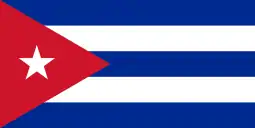
July
- July 1
- The first United Kingdom Fingerprint Bureau is established at Scotland Yard, the Metropolitan Police headquarters in London, by Edward Henry.
- The Bureau of Chemistry is established, within the United States Department of Agriculture.
- July 4
- The 1,282 foot (390 m) covered bridge crossing the Saint John River at Hartland, New Brunswick, Canada opens. It is the longest covered bridge in the world.
- William Howard Taft becomes Governor-General of the Philippines.
- July 10 – The world's first passenger-carrying trolleybus in regular service operates on the Biela Valley Trolleybus route at Königstein, Germany.
- July 24 – O. Henry is released from prison in Columbus, Ohio, after serving three years for embezzlement from the First National Bank in Austin, Texas.
August

- August 5 – Peter O'Connor sets the first International Association of Athletics Federations recognised long jump world record, of 24 ft 11¾ins. The record will stand for 20 years.
- August 6 – Discovery Expedition: Robert Falcon Scott sets sail on the RRS Discovery, to explore the Ross Sea in Antarctica.
- August 14 – The first claimed powered flight is made, by German-born American aviator Gustave Whitehead, in his Number 21, in Connecticut.
- August 21 – The International Secretariat of National Trade Union Centres is founded in Copenhagen.
- August 28 – Silliman University is founded in the Philippines, the first American private school in the country.[4]
- August 30 – Hubert Cecil Booth patents an electric vacuum cleaner, in the United Kingdom.
September
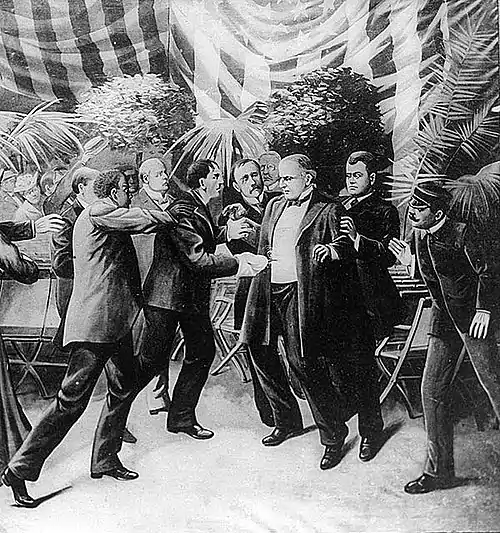
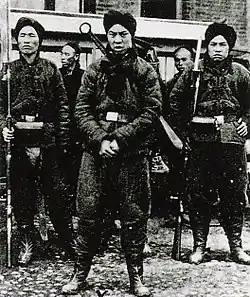
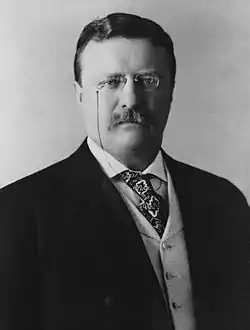
- September 2 – U.S. Vice President Theodore Roosevelt utters the famous phrase, "Speak softly and carry a big stick", at the Minnesota State Fair.
- September 3 – The National Flag of Australia flew for the first time atop the Royal Exhibition Building in Melbourne
- September 5 – The National Association of Professional Baseball Leagues (later renamed Minor League Baseball), is formed in Chicago.
- September 6 – William McKinley assassination: American anarchist Leon Czolgosz shoots U.S. President William McKinley at the Pan-American Exposition in Buffalo, New York. McKinley dies 8 days later.
- September 7 – The Boxer Rebellion in China officially ends, with the signing of the Boxer Protocol.
- September 14 – Vice President Theodore Roosevelt becomes the 26th President of the United States, upon President William McKinley's death. Roosevelt is sworn in that afternoon.
- September 26 – The body of U.S. President Abraham Lincoln is exhumed and reinterred, in concrete several feet thick.
- September 28 – Philippine–American War: Balangiga massacre: Filipino guerrillas kill more than forty United States soldiers in a surprise attack, in the town of Balangiga in Samar.
October
- October 2 – The British Royal Navy's first submarine, Holland 1, is launched at Barrow-in-Furness.
- October 4 – The American yacht Columbia defeats the British Shamrock, in the America's Cup yachting race.
- October 16 – U.S. President Theodore Roosevelt invites African American leader Booker T. Washington to the White House. The American South reacts angrily to the visit, and racial violence increases in the region.
- October 23 – Yale University celebrates its bicentennial.
- October 24 – Michigan schoolteacher Annie Edson Taylor goes over Niagara Falls in a barrel, and survives.
- October 29
- Leon Czolgosz is executed for assassinating William McKinley in Buffalo, New York on September 6.
- In Amherst, New York, nurse Jane Toppan is arrested for murdering the Davis family of Boston, with an overdose of morphine.
November
- November 1 – Sigma Phi Epsilon is founded in Richmond, Virginia.
- November 9 – The Prince George, Duke of Cornwall (later George V) becomes Prince of Wales and Earl of Chester.
- November 13 – The 1901 Caister lifeboat disaster occurs.
- November 15 – The Alpha Sigma Alpha fraternity is founded at Longwood University in Farmville, Virginia.
- November 25 – Auguste Deter is first examined by German psychiatrist Dr. Alois Alzheimer, leading to a diagnosis of the condition that will carry Alzheimer's name.[5]
- November 28 – The new Constitution of Alabama requires voters in the state to have passed literacy tests.
December
- December 3 – U.S. President Theodore Roosevelt delivers a 20,000-word speech to the House of Representatives, asking Congress to curb the power of trusts "within reasonable limits".
- December 10 – The first Nobel Prize ceremony is held in Stockholm, on the fifth anniversary of Alfred Nobel's death.
- December 12 – Guglielmo Marconi receives the first trans-Atlantic radio signal, sent from Poldhu, England, to Newfoundland; it is the letter "S" in Morse code.[6]
- December 20 – The final spike is driven into the Mombasa–Victoria–Uganda Railway, in what is now Kisumu, Kenya.
- December 22 – Charles Aked, a Baptist minister in Liverpool, says about the war in South Africa: "Great Britain cannot win the battles without resorting to the last despicable cowardice of the most loathsome cur on earth — the act of striking a brave man's heart through his wife's honour and his child's life. The cowardly war has been conducted by methods of barbarism... the concentration camps have been Murder Camps." A crowd follows him home and breaks the windows of his house.[7]
- December 31 – The Roman Catholic Platform (now known as Cemetery Station No. 2) opens in Sydney, Australia's Rookwood Cemetery.
Date unknown
- The okapi is observed for the first time (previously known only to local natives).
- New Zealand inventor Ernest Godward invents the spiral hairpin.
- American businessman William S. Harley draws up plans for his first prototype motorcycle.
- German Oscar Troplowitz invents for German company Beiersdorf the medical plaster patch called "Leukoplast".
- German engineer Richard Fiedler invents the modern Flamethrower, the Kleinflammenwerfer.
- AB Lux, as the predecessor of Electrolux, founded in Sweden.[8]
- The Intercollegiate Prohibition Association is established in Chicago.
- The Bulgarian Women's Union is founded.[9]
- Splošno slovensko žensko društvo , the first women's organisation in Slovenia, is founded.
- An American pharmacy retailer, Walgreens was founded in Chicago.[10]
Births
January
- January 1 – George Karslidis, Greek Orthodox priest, elder and saint (d. 1959)
- January 2 – Lew Landers, American director (d. 1962)
- January 3 – Ngô Đình Diệm, 1st President of South Vietnam (d. 1963)
- January 4
- Salvatore Dell'Isola, Italian conductor (d. 1989)
- C. L. R. James, Trinidad-born writer, journalist (d. 1989)
- January 7 – Teodora Fracasso, Italian Roman Catholic religious professed (d. 1927)
- January 9
- Chic Young, American cartoonist (d. 1973)
- Vilma Bánky, Hungarian-born American actress (d. 1991)
- January 10 – Henning von Tresckow, German Wehrmacht Major General (d. 1944)
- January 11 – Kwon Ki-ok, Korean pilot (d. 1988)
- January 13
- A. B. Guthrie, American novelist and historian (d. 1991)
- Mieczysław Żywczyński, Polish historian, priest (d. 1978)
- Wilhelm Hanle, German physicist (d. 1993)
- January 14
- Bebe Daniels, American actress (d. 1971)
- Alfred Tarski, Polish logician and mathematician (d. 1983)
- January 16
- Fulgencio Batista, Cuban leader (d. 1973)
- Frank Zamboni, American inventor (d. 1988)
- January 17 – Susana Calandrelli, Argentine writer and teacher (d. 1978)
- January 21 – Marcellus Boss, American politician, lawyer, member of Kansas Senate and 5th Civilian Governor of Guam (d. 1967)
- January 22 – Alberto Hurtado, Chilean Jesuit priest and saint (d. 1952)
- January 24
- Hans Erich Apostel, Austrian composer (d. 1972)
- Harry Calder, South African cricketer (d. 1995)
- January 25 – Mildred Dunnock, American actress (d. 1991)
- January 27 – Art Rooney, American football team owner (d. 1988)
- January 29 – E. P. Taylor, Canadian business tycoon (d. 1989)
- January 30
- Samir Al-Rifai, 9th Prime Minister of Jordan (d. 1965)
- Rudolf Caracciola, German race car driver (d. 1959)
February
- February 1
- Frank Buckles, last surviving American veteran of World War I (d. 2011)
- Howard I. Chapelle, American naval architect, museum curator, and author (d. 1975)
- Clark Gable, American actor (d. 1960)
- February 2 – Jascha Heifetz, Lithuanian violinist (d. 1987)
- February 3 – Arvid Wallman, Swedish diver (d. 1982)
- February 6 – Pat Harrington Sr., Canadian actor (d. 1965)
- February 8 – Virginius Dabney, American teacher, journalist, writer and editor (d. 1995)
- February 9 – Brian Donlevy, American actor (d. 1972)
- February 10
- Stella Adler, American actress, acting teacher (d. 1992)
- Anthony Prusinski, American politician (d. 1950)
- February 15
- João Branco Núncio, Portuguese bullfighter (d. 1976)
- Kenneth Callow, British biochemist (d. 1983)
- February 16 – Chester Morris, American actor (d. 1970)
- February 19 – Florence Green, British Royal Air Force member, last surviving World War I veteran (d. 2012)
- February 20 – Mohammed Naguib, 30th Prime Minister of Egypt and 1st President of Egypt (d. 1984)
- February 22
- Mildred Davis, American actress (d. 1969)
- Charles Evans Whittaker, Associate Justice of the Supreme Court of the United States (d. 1973)
- February 25 – Zeppo Marx, American comedian (d. 1979)
- February 27 – Horatio Luro, Argentine horse trainer (d. 1991)
- February 28 – Linus Pauling, American chemist, recipient of the Nobel Prize in Chemistry and Peace (d. 1994)
March
- March 3 – Claude Choules, British World War I veteran, last surviving combat veteran from any nation (d. 2011)
- March 4
- Charles Goren, American bridge player (d. 1991)
- Jean-Joseph Rabearivelo, Malagasy-French poet (d. 1937)
- March 9 – Joachim Hämmerling, German-Danish biologist (d. 1980)
- March 13 – Paul Fix, American actor (d. 1983)
- March 17 – Alfred Newman, American film composer (d. 1970)
- March 21
- Karl Arnold, German politician (d. 1958)
- Carmelita Geraghty, American actress (d. 1966)
- March 22 – Greta Kempton, American artist (d. 1991)
- March 23 – Bon Maharaja, Indian guru, religious writer (d. 1982)
- March 24 – Ub Iwerks, American cartoonist (d. 1971)
- March 25 – Ed Begley, American actor (d. 1970)
- March 26 – Teresa Demjanovich, American Roman Catholic religious professed and blessed (d. 1927)
- March 27
- Carl Barks, American cartoonist, screenwriter (d. 2000)
- Erich Ollenhauer, German politician (d. 1963)
- Enrique Santos Discépolo, Argentine tango, milonga musician and composer (d. 1951)
- Eisaku Satō, Prime Minister of Japan, recipient of the Nobel Peace Prize (d. 1975)
- Kenneth Slessor, Australian poet (d. 1971)
- March 28 – Jack Weil, American entrepreneur (d. 2008)
April
.jpg.webp)
- April 1 – Whittaker Chambers, American spy (d. 1961)
- April 5 – Melvyn Douglas, American actor (d. 1981)
- April 13 – Jacques Lacan, French psychoanalyst, psychiatrist (d. 1981)
- April 15
- Joe Davis, English snooker, billiards player (d. 1978)
- Ajoy Mukherjee, Indian politician, Chief Minister of West Bengal (d. 1986)
- René Pleven, Prime Minister of France (d. 1993)
- April 16 – Lajos Dinnyés, 41st Prime Minister of Hungary (d. 1961)
- April 18 – Al Lewis, American songwriter (d. 1967)
- April 19 – Kiyoshi Oka, Japanese mathematician (d. 1978)
- April 29 – Hirohito, Emperor of Japan (d. 1989)
- April 30 – Simon Kuznets, Ukrainian-born economist, Nobel Prize laureate (d. 1985)
May
- May 2 – Chiyo Miyako, Japanese supercentenarian, last surviving person born in 1901 (d. 2018)
- May 3 – Gino Cervi, Italian actor (d. 1974)
- May 7 – Gary Cooper, American actor (d. 1961)
- May 11 – Rose Ausländer, German poet (d. 1988)
- May 13 – Witold Pilecki, Polish resistance leader (executed 1948)
- May 17 – Werner Egk, German composer (d. 1983)
- May 18 – Vincent du Vigneaud, American chemist, Nobel Prize laureate (d. 1978)
- May 20
- Max Euwe, Dutch chess player (d. 1981)
- Doris Fleeson, American journalist (d. 1970)
- May 21
- Manfred Aschner, German-born Israeli microbiologist, entomologist and recipient of the Israel Prize (d. 1989).
- Horace Heidt, American bandleader (d. 1986)
- Sam Jaffe, American film producer (d. 2000)
- Suzanne Lilar, Belgian essayist, novelist and playwright (d. 1992)
- May 24 – Gustav Åkerman, Swedish army officer (b. 1988)
- May 25 – Antônio de Alcântara Machado, Brazilian novelist (d. 1935)
- May 31 – Alfredo Antonini, American conductor, composer (d. 1983)
June
- June 3 – Zhang Xueliang, Chinese military leader (d. 2001)
- June 6 – Sukarno, 1st President of Indonesia (d. 1970)
- June 7 – Hugo Ballivián , Bolivian military officer, 44th President of Bolivia (d. 1993)
- June 12 – Arnold Kirkeby, American hotelier, art collector, and real estate investor (d. 1962)
- June 13
- Tage Erlander, Swedish politician (social democrat), prime minister of Sweden for 23 years (1946–1969) (d. 1985)
- Jean Prévost, French writer, journalist and member of the Maquis (d. 1944)
- June 16 – Henri Lefebvre, French Marxist philosopher, sociologist (d. 1991)
- June 17 – F. F. E. Yeo-Thomas, English World War II hero (d. 1964)
- June 18
- Grand Duchess Anastasia of Russia (d. 1918)
- Denis Johnston, Irish playwright (d. 1984)
- June 20 – Princess Nina Georgievna of Russia (d. 1974)
- June 23
- Richard Ripley, British athlete (d. 1996)
- Chuck Taylor, American basketball player, salesman (d. 1969)
- June 24
- Marcel Mule, French saxophonist (d. 2001)
- Harry Partch, American composer (d. 1974)
- June 25 – Giovanni Barbini, Italian naval officer (d. 1998)
- June 26 – Stuart Symington, American politician (d. 1988)
- June 27 – Merle Tuve, American physicist (d. 1982)
- June 29 – Nelson Eddy, American singer, actor (d. 1967)
July
- July 1 – Tom Gorman, Australian rugby league footballer (d. 1978)
- July 4 – Curtis Shears, American fencer (d. 1988)
- July 7
- Seán Clancy, oldest Irish War of Independence veteran (d. 2006)
- Eiji Tsuburaya, Japanese film director and special effects designer (d. 1970)
- Gustav Knuth, German film actor (d. 1987)
- Vittorio De Sica, Italian actor and film director (d. 1974)
- July 9
- Frank Finnigan, Canadian ice hockey player (d. 1991)
- Barbara Cartland, British novelist (d. 2000)
- Lou Polli, Italian baseball pitcher (d. 2000)
- July 10 – Daniel V. Gallery, American admiral and author (d. 1977)
- July 13 – Eric Portman, English actor (d. 1969)
- July 14 – Lucien Prival, American actor (d. 1994)
- July 17 – Bruno Jasieński, Polish poet (d. 1938)
- July 20 – Heinie Manush, American baseball player (d. 1971)
- July 21
- Sue Wah Chin, Australian entrepreneur (d. 2000)
- Albert Hamilton Gordon, American businessman and philanthropist (d. 2009)
- July 24
- Mabel Albertson, American actress (d. 1982)
- Igor Ilyinsky, Soviet and Russian actor, comedian and director (d. 1987)
- July 28 – Rudy Vallée, American actor and jazz musician (d. 1986)
- July 31 – Jean Dubuffet, French painter (d. 1985)
August
- August 1 – Pancho Villa, Filipino boxer (d. 1925)
- August 4 – Louis Armstrong, American jazz musician (d. 1971)
- August 5 – Thomas J. Ryan, American admiral (d. 1970)
- August 8 – Ernest Lawrence, American physicist, Nobel Prize laureate (d. 1958)
- August 9 – Charles Farrell, American actor (d. 1990)
- August 10 – Franco Dino Rasetti, Italian scientist (d. 2001)
- August 14 – Alice Rivaz, Swiss writer (d. 1998)
- August 18
- Lucienne Boyer, French singer (d. 1983)
- Jean Guitton, French writer and philosopher (d. 1999)
- August 20 – Salvatore Quasimodo, Italian novelist, writer and Nobel Prize laureate (d. 1968)
- August 24 – Edmund Germer, German electrical engineer and inventor (d. 1987)
- August 26
- Maxwell D. Taylor, American general (d. 1987)
- Chen Yi, Chinese military commander and politician (d. 1972)
- Jan de Quay, Dutch politician, psychologist and 31st Prime Minister of the Netherlands (d. 1985)
- August 28 – Babe London, American actress and comedian (d. 1980)
- August 30
- John Gunther, American writer (d. 1970)
- Roy Wilkins, American civil rights activist (d. 1981)
September
- September 2
- Andreas Embirikos, Greek poet (d. 1975)
- Adolph Rupp, American college basketball coach (d. 1977)
- September 4 – William Lyons, British automobile engineer, designer (d. 1985)
- September 5
- Mario Scelba, 33rd Prime Minister of Italy (d. 1991)
- Florence Eldridge, American actress (d. 1988)
- September 7 – Abdallah El-Yafi, 7-time Prime Minister of Lebanon (d. 1986)
- September 8 – Hendrik Verwoerd, 6th Prime Minister of South Africa (d. 1966)
- September 9 – James Blades, English percussionist (d. 1999)
- September 12
- Ben Blue, Canadian-born comedian, actor (d. 1975)
- Shmuel Horowitz, Russian-born Israeli agronomist (d. 1999)
- September 13 – Claude Dupuy, French Roman Catholic priest and bishop (d. 1989)
- September 14 – Andrey Vlasov, Soviet general, commander of the Russian Liberation Army (d. 1946)
- September 15 – Sir Donald Bailey, British civil engineer (d. 1985)
- September 16 – Andrée Brunet, French pair skater (d. 1993)
- September 17 – Sir Francis Chichester, British sailor (d. 1972)
- September 22
- Charles Brenton Huggins, Canadian-born cancer researcher, recipient of the Nobel Prize in Physiology or Medicine (d. 1997)
- Nadezhda Alliluyeva-Stalin, second wife of Joseph Stalin (d. 1932)
- September 23 – Jaroslav Seifert, Czech writer, Nobel Prize laureate (d. 1986)
- September 24 – Gerald Warner Brace, American writer, educator, sailor and boat builder (d. 1978)
- September 25
- Robert Bresson, French film director (d. 1999)
- Gordon Coventry, Australian rules footballer (d. 1968)
- September 26 – George Raft, American film actor (d. 1980)
- September 28
- Ed Sullivan, American entertainer (d. 1974)
- William S. Paley, American businessman, founder of CBS (d. 1990)
- September 29
- Enrico Fermi, Italian physicist, Nobel Prize laureate (d. 1954)
- Lanza del Vasto, Italian philosopher, poet, and activist (d. 1981)
October
- October 2 – Alice Prin, French singer (d. 1953)
- October 3 – Jean Grémillon, French film director (d. 1959)
- October 10 – Alberto Giacometti, Swiss sculptor (d. 1966)
- October 17 – Cesare Bettarini, Italian actor (d. 1975)
- October 19 – Arleigh Burke, American admiral (d. 1996)
- October 20
- Evelyn Brent, American actress (d. 1975)
- Adelaide Hall, American jazz singer, entertainer (d. 1993)
- October 22 – Wijeyananda Dahanayake, 5th Prime Minister of Sri Lanka (d. 1997)
- October 24
- Gilda Gray, Polish-born dancer, actress (d. 1959)
- Moultrie Kelsall, Scottish film, television actor (d. 1980)
- October 28 – Hilo Hattie, native Hawaiian singer, actress (d. 1979)
- October 29 – Ana María Vela Rubio, Spanish supercentenarian (d. 2017)
November
- November 2 – James Dunn, American actor (d. 1967)
- November 3
- Prithviraj Kapoor, pioneer of Indian Cinema and Indian Theatre (d. 1972)
- Leopold III of Belgium (d. 1983)
- November 4
- Yi Bangja, Crown Princess of Korea (d. 1989)
- Max Wagner, Mexican-born American film actor (d. 1975)
- November 7 – Norah McGuinness, Irish painter, illustrator (d. 1980)
- November 8 – Xu Xiangqian, Communist military leader in the People's Republic of China, former defense minister (d. 1990)
- November 11
- Helen Reichert, American broadcaster and educator (d. 2011)
- Magda Goebbels, wife of German Propaganda Minister Joseph Goebbels (d. 1945)
- November 13 – Arturo Jauretche, Argentine writer, politician, and philosopher (d. 1974)
- November 17 – Lee Strasberg, Polish-born American actor, acting teacher and co-founder of method acting (d. 1982)
- November 18 – George Gallup, American statistician, opinion pollster (d. 1984)
- November 19 – Nina Bari, Soviet and Russian mathematician (d. 1961)[11]
- November 22
- Lee Patrick, American actress (d. 1982)
- Joaquín Rodrigo, Spanish composer (d. 1999)
- November 25
- Marziyya Davudova, Soviet and Azerbaijani actress (d. 1962)
- Fernando Tambroni, Italian politician, 36th Prime Minister of Italy (d. 1963)
- November 27 – George Scott Register, American judge (d. 1972)
- November 28
- Walter Havighurst, American critic, novelist, literary and social historian of the Midwest, professor of English at Miami University (d. 1994)
- Roy Urquhart, British general (d. 1988)
- November 29 – Mildred Harris, American actress (d. 1944)
December
- December 5
- Walt Disney, American animator, film producer (d. 1966)
- Milton Erickson, American psychiatrist (d. 1980)
- Werner Heisenberg, German physicist, Nobel Prize laureate (d. 1976)
- December 7 – Troy Sanders, American film score composer (d. 1959)
- December 8 – Arthur Leslie, British actor (d. 1970)
- December 9 – Jean Mermoz, French aviator (d. 1936)
- December 12 – Fred Barker, American criminal, youngest son of Ma Barker (d. 1935)
- December 16 – Margaret Mead, American cultural anthropologist (d. 1978)
- December 19
- Rudolf Hell, German inventor (d. 2002)
- Vitorino Nemesio, Portuguese poet and author (d. 1978)
- December 25 – Princess Alice, Duchess of Gloucester (d. 2004)[12]
- December 27 – Marlene Dietrich, German-American actress (d. 1992)
- December 31
- Julia Bathory, Hungarian glass designer (d. 2000)
- Karl-August Fagerholm, Prime Minister of Finland (d. 1984)
Deaths
January
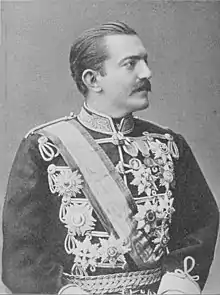
- January 1 – Ignatius L. Donnelly, American politician, writer (b. 1831)
- January 8 – John Barry, Irish recipient of the Victoria Cross (b. 1873)
- January 10 – Sir James Dickson, Premier of Queensland, Australian Minister for Defence (b. 1832)
- January 11 – Vasily Kalinnikov, Russian composer (b. 1866)
- January 14 – Víctor Balaguer, Spanish politician, author (b. 1824)
- January 16
- Arnold Böcklin, Swiss artist (b. 1827)
- Mahadev Govind Ranade, Indian reformer (b. 1842)
- January 17
- Leonard Fulton Ross, American Civil War general (b. 1823)
- Frederic W. H. Myers, British poet (b. 1843)
- January 19 – Albert, 4th duc de Broglie, French politician, 28th Prime Minister of France (b. 1821)
- January 21 – Elisha Gray, American inventor, appliance manufacturer (b. 1835)
- January 22 – Queen Victoria of the United Kingdom, Empress of India (b. 1819)
- January 27 – Giuseppe Verdi, Italian composer (b. 1813)
- January 28 – Iosif Gurko, Russian field marshal (b. 1828)
February
- February 7
- Ana Betancourt, Cuban national heroine (b. 1832)
- Rowena Granice Steele, wrote the first novel by a woman in California (b. 1824)
- February 10 – Max von Pettenkofer Bavarian chemist, hygienist (b. 1818)
- February 11
- King Milan I of Serbia (b. 1854)
- Ramón de Campoamor, Spanish poet (b. 1817)
- February 14 – Sir Edward Stafford, Scottish-New Zealand educator, politician and 3rd Prime Minister of New Zealand (b. 1819)
- February 18 – Anna Gardner, American abolitionist (b. 1816)
- February 22 – George Francis FitzGerald, Irish mathematician (b. 1851)
- February 26 – Lucyna Ćwierczakiewiczowa, Polish writer (b. 1829)
March
- March 13 – Benjamin Harrison, 23rd President of the United States (b. 1833)
- March 18 – Patrick Donahoe, American businessman, publisher of the Boston Catholic newspaper The Pilot (b. 1811)
- March 23 – Konstantin Stoilov, 8th Prime Minister of Bulgaria (b. 1853)
- March 31 – Sir John Stainer, British composer and organist (b. 1840)
April
- April 1 – François-Marie Raoult, French chemist (b. 1830)
- April 3 – Richard D'Oyly Carte, English impresario (b. 1844)
- April 10 – Harriet Newell Kneeland Goff, American reformer (b. 1828)
- April 19 – Alfred Horatio Belo, American businessman, newswriter (b. 1839)
- April 24 – Arvid Posse, 2nd Prime Minister of Sweden (b. 1820)
- April 26 – Harriett Ellen Grannis Arey, American educator (b. 1819)
May
- May 1 – Lewis Waterman, American inventor, businessman (b. 1837)
- May 5
- Axel Wilhelm Eriksson, Swedish settler, trader in South-West Africa (b. 1846)
- Mariano Ignacio Prado, Peruvian general, statesman, and three-time President of Peru (b. 1825)
- May 7 – Dimitar Grekov, 10th Prime Minister of Bulgaria (b. 1847)
- May 19 – Marthinus Wessel Pretorius, 1st President of South Africa (b. 1819)
- May 21 – Sir John Commerell, British admiral of the fleet (b. 1829)
- May 22 – Gaetano Bresci, Italian anarchist and assassin (b. 1869)
- May 24 – Charlotte Mary Yonge, English novelist (b. 1823)
- May 31 – Ernest de Sarzec, French archeologist (b. 1832)
June
- June 2 – George Leslie Mackay, Canadian missionary (b. 1844)
- June 4 – Charlotte Fowler Wells, American phrenologist (b. 1814)
- June 9
- Walter Besant, English writer (b. 1836)
- Adolf Bötticher, German art historian (b. 1842)
- June 13 – Leopoldo Alas, 'Clarín', Spanish novelist (b. 1852)
- June 16 – Herman Grimm, German historian (b. 1828)
- June 21 – Anthony Hoskins, British admiral (b. 1828)
- June 25 – Alexandru Candiano-Popescu, Romanian general, lawyer, journalist, and poet (b. 1841)
July
- July 4
- John Fiske, American philosopher (b. 1842)
- Johannes Schmidt, German linguist (b. 1843)
- July 6
- Chlodwig, Prince of Hohenlohe-Schillingsfürst, Chancellor of Germany (b. 1819)
- Joseph LeConte, American physician, geologist (b. 1823)
- July 7 – Johanna Spyri, Swiss writer (b. 1827)
- July 10 – Kliment of Tarnovo, 2nd Prime Minister of Bulgaria (b. 1841)
- July 11 – Marietta Bones, American suffragist, social reformer, philanthropist (b. 1842)
- July 18 – Jan ten Brink, Dutch writer (b. 1834)
- July 28 – John Irwin, American admiral (b. 1832)
August
- August 4 – Harriet Pritchard Arnold, American author (b. 1858)
- August 5
- Victoria, Princess Royal (b. 1840)
- Alfred Heaver, English property developer (b. 1841)
- August 12 – Francesco Crispi, 11th Prime Minister of Italy (b. 1819)
- August 19 – Shō Tai, last king of the Ryūkyū Kingdom in Japan (b. 1843)
- August 21 – Adolf Eugen Fick, German-born physician and physiologist (b. 1829)
- August 24 – Clara Maass, American nurse (b. 1876)
September
- September 9 – Henri de Toulouse-Lautrec, French painter (b. 1864)
- September 10 – Emanuella Carlbeck, Swedish educator and social reformer (b. 1829)
- September 14 – William McKinley, 25th President of the United States (assassinated) (b. 1843)
- September 15 – Sir Joseph Palmer Abbott, Australian politician and solicitor (b. 1842)
- September 25 – Sir Arthur Fremantle, British army general (b. 1835)
October
- October 1 – Abdur Rahman Khan, Emir of Afghanistan (b. 1844)
- October 10 – Lorenzo Snow, American Mormon leader (b. 1814)
- October 11 – Sir Lloyd Mathews, British naval officer and politician (b. 1850)
- October 15 – Carlos María Fitz-James Stuart, 16th Duke of Alba, Spanish aristocrat (b. 1849)
- October 19 – Carl Frederik Tietgen, Danish financier, industrialist (b. 1829)
- October 23 – Georg von Siemens, German banker (b. 1839)
- October 28 – Paul Rée, German author and philosopher (b. 1849)
- October 29
- Leon Czolgosz, Polish-American assassin of U.S. President William McKinley (executed) (b. 1873)
- John Kemp Starley, English bicycle inventor (b. 1854)
- October 31 – Robert Abbott, Australian politician (b. 1830)
November
- November 7 – Li Hongzhang, Chinese general (b. 1823)
- November 13 – Sir William Stewart, British admiral (b. 1822)
- November 21 – V. A. Urechia, Romanian historian, writer and politician (b. 1834)
- November 27 – Clement Studebaker, American manufacturer (b. 1831)
- November 29 – Francisco Pi y Margall, Spanish politician, former president of the Republic (b. 1824)
- November 30 – Edward John Eyre, English explorer (b. 1815)
December
- December 1 – George Lohmann, English cricketer (b. 1865)
- December 6 – Bertha Wehnert-Beckmann, German photographer (b. 1815)
Nobel Prizes
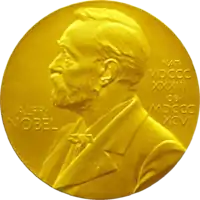
Significance of 1901 for modern computers
The date of Friday December 13 20:45:52 1901 is significant for modern computers because it is the earliest date representable with a signed 32-bit integer on systems that reference time in seconds since the Unix epoch. This corresponds to -2147483648 seconds from Thursday January 1 00:00:00 1970. For the same reason, many computers are also unable to represent an earlier date. For related reasons, many computer systems suffer from the Year 2038 problem. This is when the positive number of seconds since 1970 exceeds 2147483647 (01111111 11111111 11111111 11111111 in binary) and wraps to -2147483648. Hence the computer system erroneously displays or operates on the time Friday December 13 20:45:52 1901. In this way, the year 1900 is to the Year 2000 problem as the year 1901 is to the Year 2038 problem.
References
- Grant, Neil (1993). Chronicle of 20th Century Conflict. New York City: Reed International Books Ltd. & SMITHMARK Publishers Inc. pp. 18–19. ISBN 978-0-8317-1371-3.
- Derrik Mercer (February 1993). Chronicle of the Royal Family. Chronicle Communications. p. 478. ISBN 978-1-872031-20-0.
- "Women & Children in White Concentration Camps during the Anglo-Boer War". White Concentration Camps: Anglo-Boer War: 1900–1902. South African History Online. Archived from the original on June 7, 2011. Retrieved October 25, 2010.
- "NHI Resolution No.7, Series 2002" Archived July 21, 2011, at the Wayback Machine. National Historical Institute. Retrieved 2010-03-30.
- "Alois Alzheimer". Whonamedit?. Retrieved October 21, 2011.
- Bussey, Gordon (2000). Marconi's Atlantic Leap. Coventry: Marconi. ISBN 978-0-9538967-0-7.
- "Women & Children in White Concentration Camps during the Anglo-Boer War". White Concentration Camps: Anglo-Boer War: 1900–1902. South African History Online. Archived from the original on June 7, 2011. Retrieved October 25, 2010.
- sv:Luxlampa/Luxlampan (Swedish language edition). Retrieved December 2018.
- Haan, Francisca de; Daskalova, Krasimira; Loutfi, Anna (2006). Biographical Dictionary of Women's Movements and Feminisms in Central, Eastern, and South Eastern Europe: 19th and 20th Centuries. Central European University Press. p. 235. ISBN 978-963-7326-39-4.
- Garside, Juliette (June 19, 2012). "Walgreens: a short history". The Guardian. Retrieved July 3, 2020.
- Spetich, Joan; Cameron, Douglas E. (1987). "Nina Karlovna Bari". In Grinstein, Louise S.; Campbell, Paul J. (eds.). Women of Mathematics: a Biobibliographic Sourcebook. New York: Greenwood Press. p. 6. ISBN 978-0-3132-4849-8.
- Panton, James. Historical Dictionary of the British Monarchy. Scarecrow Press. p. 42. ISBN 978-0-8108-7497-8.
Further reading
- Appletons' Annual Cyclopaedia and Register of Important Events. D. Appleton & Company. 1902.
- Gilbert, Martin. A History of the Twentieth Century: vol. 1 1900–1933 (1997) pp 36–54; Global coverage of politics, diplomacy etc.
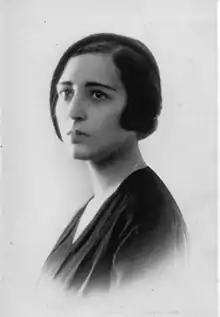




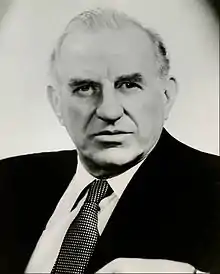



_Gino_Cervi.jpg.webp)
.jpg.webp)




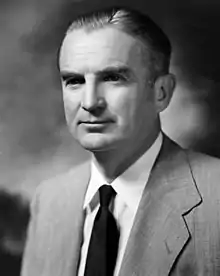
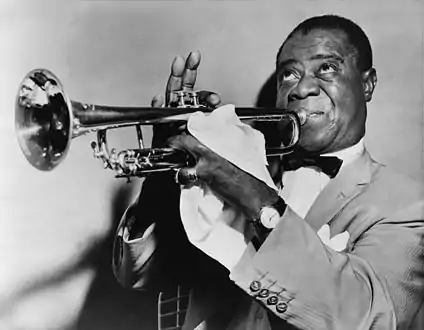







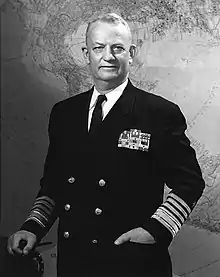
_(cropped).jpg.webp)


.jpg.webp)


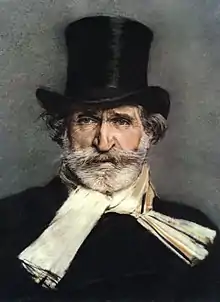
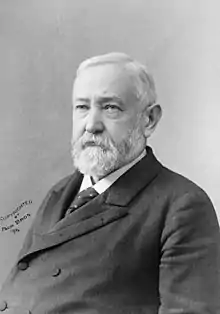
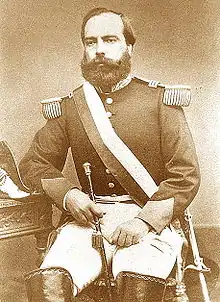
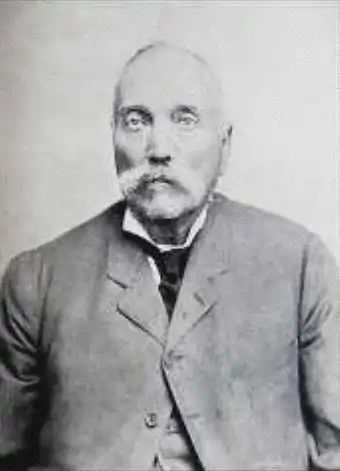
.jpg.webp)
